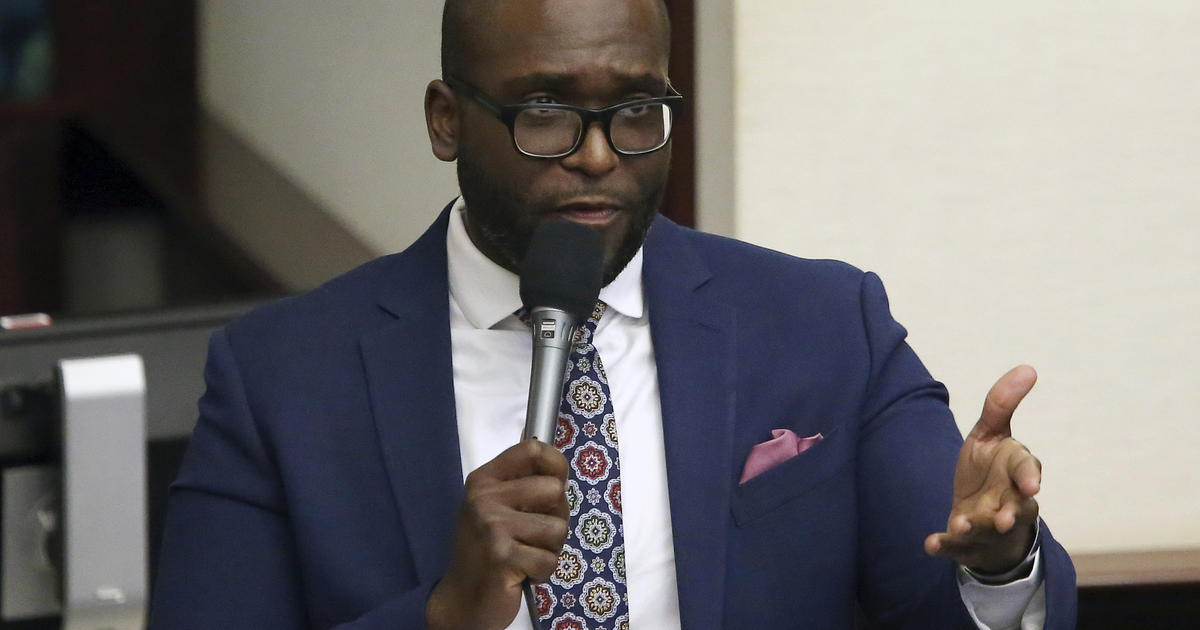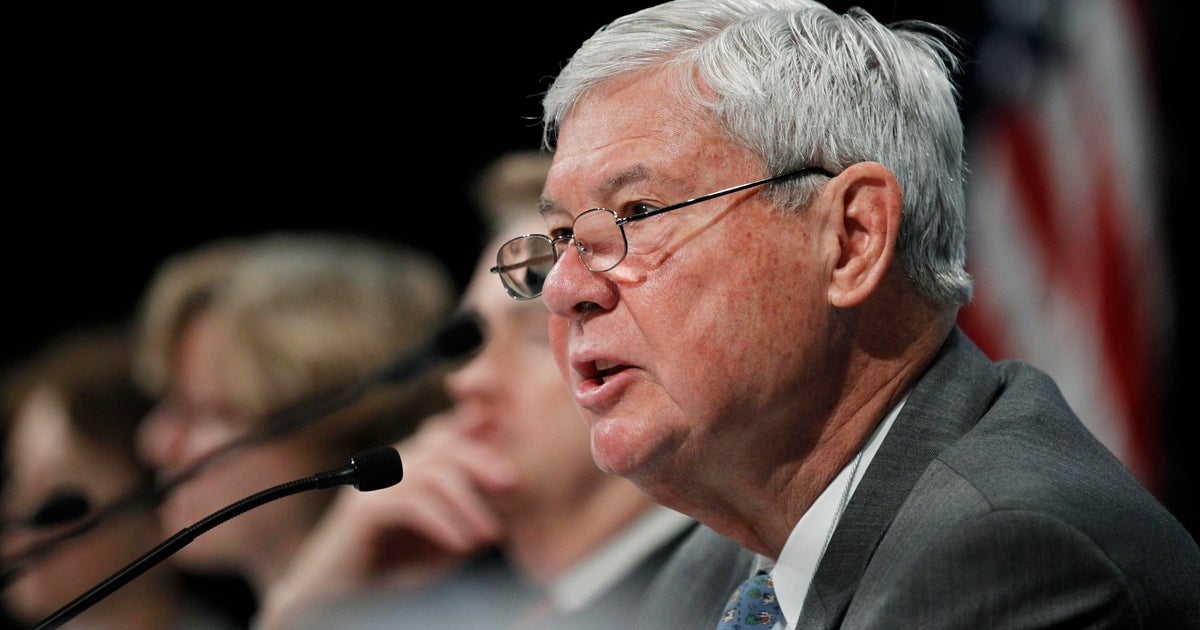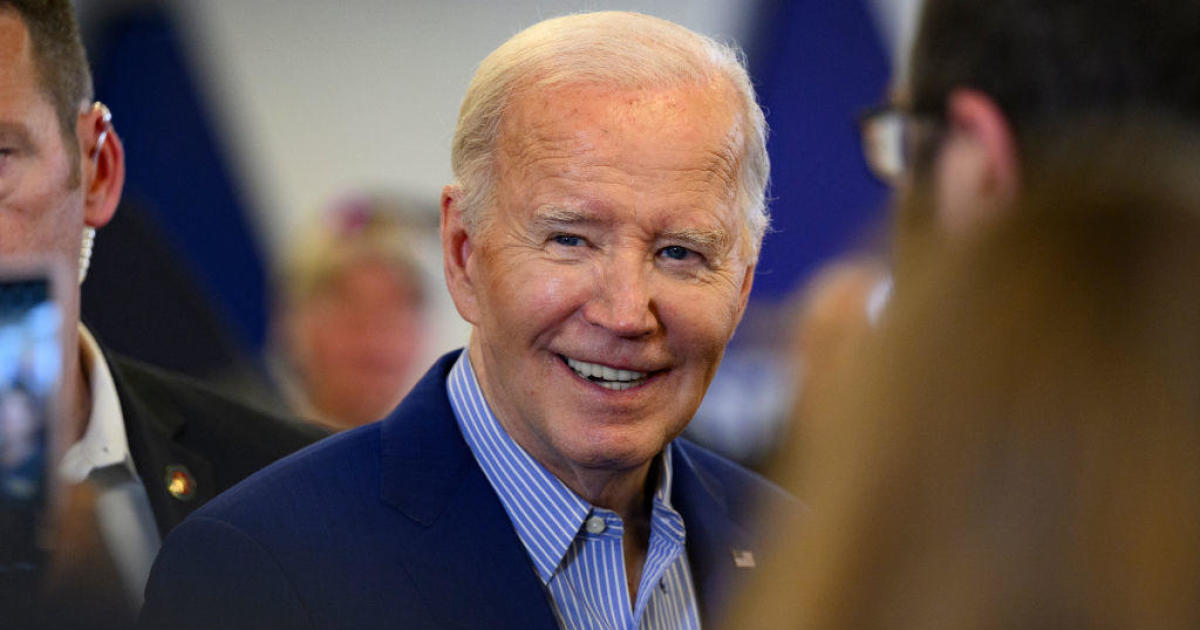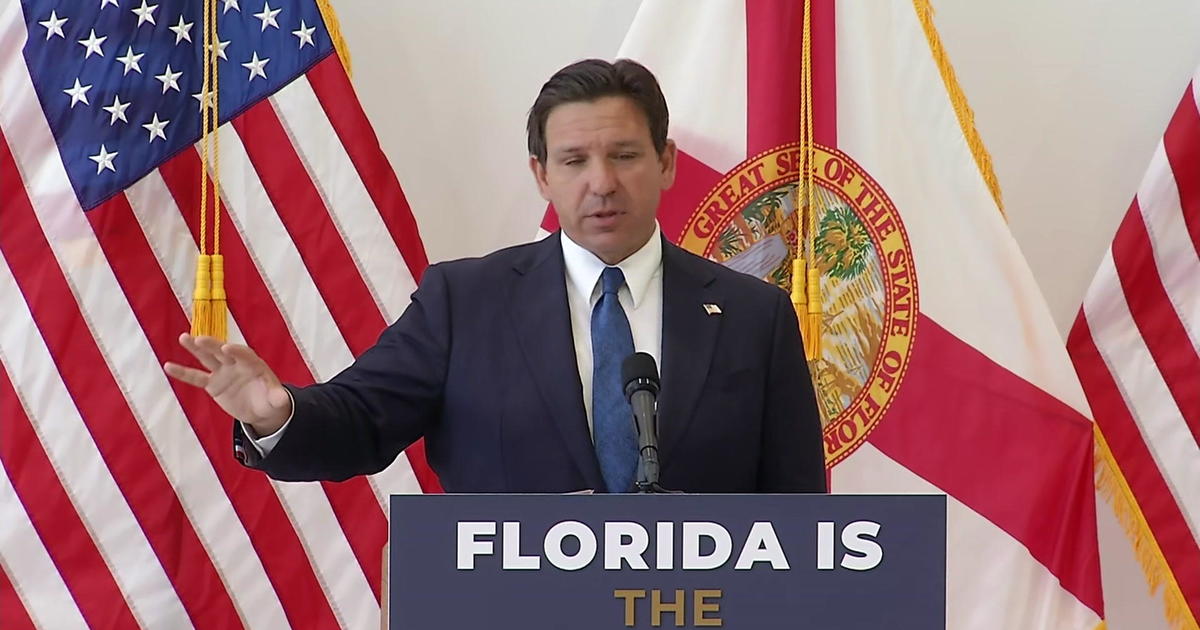2014 Roundup: A Year Of Change And Stability
Follow CBSMIAMI.COM: Facebook | Twitter
TALLAHASSEE (CBSMiami/NSF) - In some ways, the state of Florida has remained remarkably stable over the past year.
Gov. Rick Scott and the entire Cabinet won re-election. Republicans maintain control of both chambers in the Florida Legislature. Indeed, the 40 senators who saw the final gavel fall on the last night of the 2014 legislative session were set to return to Tallahassee for the opening day of the 2015 session, until former Sen. John Thrasher moved several blocks west to become president of Florida State University.
But there was change under the surface. Gay marriage is likely a couple of weeks away from being legal in Florida. The state is inching along the road to legalizing marijuana, at least for medicinal purposes. And Scott became more open to providing at least some benefits to undocumented immigrants. The more things stay the same, the more they change, it seems.
IN GOVERNOR VS. GOVERNOR, GOVERNOR PREVAILS
One of the most anticipated governor's races in years, at least among the state's political class, ended up being one of the nastiest. Scott and his immediate predecessor, Republican-turned-independent-turned-Democrat Charlie Crist, spent most of 2014 clobbering each other. Both coasted to easy primary wins after Crist snubbed former Senate Minority Leader Nan Rich, D-Weston, and Scott ignored unknown and lightly-funded GOP challengers.
Scott was down badly in the polls to start the year --- Crist led 46 percent to 38 percent, according to a Quinnipiac University poll in January --- but launched a determined effort to burnish his image. Scott pushed a bill granting in-state tuition rates to some undocumented immigrants, boosted education funding to an all-time high and even made nods toward environmental protection. But he also undertook the same kind of scorched-earth campaign that helped him defeat former Attorney General Bill McCollum and former Chief Financial Officer Alex Sink in 2010, spending tens of millions of dollars on ads to define Crist as an opportunist who "ran away" from the governor's office four years earlier.
And Crist gave as good as he got, portraying Scott as a plutocrat out of touch with everyday people --- a Mitt Romney without the hair. Every time the candidates seemed to go as low as they could, they found new depths to plumb.
"They're going to announce at 8 o'clock that we are going to kick Charlie's rear," Scott said the day before the election. "And he deserves it. Because he doesn't worry about our families."
The personal animosity between the two might have reached its peak when a debate at Broward College started late because of a dispute about whether Crist could have a personal electric fan on the stage to keep him cool. Crist defended the fan --- which appeared to be against the rules of the debate --- during the closing minutes of the contest.
"Is there anything wrong with being comfortable?" Crist said
Crist was likely not comfortable on election night, when Scott narrowly defeated the man with a fan to clinch a second term.
COURTS SAY 'I DO' TO GAY MARRIAGE
A little more than three years ago, the stated position of President Barack Obama on same-sex marriage was that he supported civil unions for gay couples but still opposed actual marriage, though he was "evolving" on the issue. That was the position of a left-of-center Democrat.
Since then, the nation evolved rapidly --- and a string of court decisions favoring gay-marriage rights prompted couples to challenge Florida's ban on same-sex marriage in state and federal courts. Eventually, U.S. District Judge Robert Hinkle in August found that Florida's voter-approved ban was unconstitutional.
"The undeniable truth is that the Florida ban on same-sex marriage stems entirely, or almost entirely, from moral disapproval of the practice," Hinkle wrote.
Attorney General Pam Bondi continued to fight the ruling, going all the way to the U.S. Supreme Court in an unsuccessful effort to extend a stay on Hinkle's ruling that is set to expire at the end of the day Jan. 5, as the state continues to appeal. And social conservatives were appalled.
"People ask me, are you on the wrong side of history?" said Florida Family Policy Council President John Stemberger. "To me, this issue will never be on the wrong side of history because it's rooted in the human experience. A little boy who longs to have a father in the inner city --- that will never be on the wrong side of history. The little girl who has two dads and doesn't have a mom and she wants someone to guide her through the changes that a woman's body goes through --- that's never going to be on the wrong side of history. And the beauty of how a man and woman come together and life is born and the next generation springs from that, that's never going to be on the wrong side of history."
The fight didn't seem over just yet. A memo issued in December by attorneys for the Florida Court Clerks & Comptrollers advised county officials statewide against issuing marriage licenses. The memo said Hinkle's decision striking down Florida's ban on same-sex marriage only applies to issuing licenses in the Panhandle's Washington County, where one of the gay couples involved in the challenge to the ban lives.
But Equality Florida, a prominent group supporting legalization of same-sex marriage, issued a news release the following week saying clerks "have a legal obligation to issue marriage licenses to same-sex couples --- or risk expensive litigation, including liability for damages and attorney fees."
Regardless of the legal maneuvers, the issue appears destined to be settled in a way that seemed unlikely a few years earlier.
WHOSE LINE IS IT?
From past internal fractures in the GOP-dominated Legislature to gossip about where certain lawmakers lived to an undercover map-drawing scheme worthy of an Ocean's Eleven movie, a redistricting trial that started in May gave lawyers and political observers plenty of time to talk about dirty political laundry inside the Capitol.
The only Perry Mason moment of the trial came when lawyers for voting-rights organizations uncovered evidence that at least one person who supposedly submitted a congressional map to the Legislature during the once-a-decade redistricting process in 2012 said he had never submitted that map. (Unlike Perry Mason, there were few murmurs in the courtroom, because an audience was almost nonexistent.) Instead, that map appeared to come from a Republican political consultant.
That and other evidence led Leon County Circuit Judge Terry Lewis to at least partly agree with the voting-rights groups and conclude that GOP operatives had, in fact, influenced the redistricting process, running afoul of a constitutional ban on political gerrymandering.
"They managed to taint the redistricting process and the resulting map with improper partisan intent," Lewis wrote. "There is just too much circumstantial evidence of it, too many coincidences, for me to conclude otherwise."
But Lewis ruled just two congressional districts were unconstitutional, and the Legislature convened a special session and passed a relatively minor set of tweaks to fix the problem --- prompting the voting-rights groups, which include the League of Women Voters of Florida, to appeal to the Florida Supreme Court in search of a wider overhaul.
In the meantime, justices from the high court unanimously ruled that redistricting records from GOP consultant Pat Bainter should be unsealed. The records had been used in the trial but kept secret while Bainter pursued his appeals. With his emails and testimony opened up, more secrets about the process came spilling out.
What emerged from those records was evidence that Bainter and his allies inside and outside Data Targeting, Inc., Bainter's consulting firm, firm drew maps that were then submitted under the names of members of the public.
The map attributed to Florida State University student Alex Posada --- he of the Perry Mason moment --- was the only one that the voting-rights groups say was used to help guide the drawing of the congressional map. But other maps submitted under the names of Christie Jones, Micah Ketchel, Andrew Ladd, Delena May, Alex Patton and Remzey Samarrai were used to guide the process of drawing Senate maps, they say.
During his testimony, Bainter gave a more innocent explanation of how the maps ended up being submitted by everyday citizens.
"Well, we certainly had, again, a number of citizens out there that -- that wanted to be involved," Bainter said. "And, yeah, so we absolutely would -- would give them the opportunity, if we had maps sitting around that -- that could be submitted, it seemed like a good idea to do that."
Lewis apparently didn't buy that argument. Whether the Supreme Court does or not could decide the fate of the state's congressional districts for years to come.
WHICH GRASS IS GREENER?
For lawmakers, lobbyists and journalists at the Capitol in 2014, it was time to learn more about marijuana than they had ever known --- well, at least since their days in college.
In January, trial attorney and Democratic mega-donor John Morgan won two victories: The Florida Supreme Court signed off on the ballot summary for a proposed constitutional amendment aimed at allowing medical marijuana in the state, and Morgan gathered enough signatures to put the measure before voters in the November elections.
Morgan and Democratic candidates --- perhaps envisioning a flood of young voters flocking to the polls --- applauded the Supreme Court ruling.
"We need to quit devoting government resources to meddling in the lives of people who are suffering and focus our resources on making life better and more productive for the citizens of Florida," said George Sheldon, a Democratic candidate for attorney general.
But Republicans argued that the amendment language was too broad and would open to the door to widespread smoking of weed.
"Make no mistake: this is not about compassionate medical marijuana," said then-House Speaker Will Weatherford, R-Wesley Chapel. "This is about the Coloradofication of Florida, where the end game is a pot shop on every street corner."
Against the odds --- polls initially showed huge majorities in favor of the measure --- opponents managed to hold the "Yes" vote on the amendment to less than the 60 percent in November, killing the proposal.
By then, the Legislature had agreed to make available a more limited form of medical marijuana. A law approved during the spring session legalized cannabis low in euphoria-inducing tetrahydrocannabinol, or THC, and high in cannabadiol, or CBD, for patients with severe muscle spasms or cancer. The pot purportedly doesn't get users high but is believed to alleviate life-threatening seizures in children with rare forms of epilepsy.
However, the Department of Health rules for providing that marijuana were bogged down in a procedural battle as the year neared an end, and advocates for the constitutional amendment for a more widespread pot prescription were already promising a second attempt.
"We are going to pass a medical marijuana law in Florida by the end of 2016," pledged Ben Pollara, head of the committee that tried to get voters to approve the proposed constitutional amendment in November.
HAIL TO THE CHIEFS
Some of the biggest jobs in Florida higher education were handed out in 2014, including the presidencies of the University of Florida, Florida State University and Florida A&M University. And there seemed to be two routes to get one of those posts: have a position at prestigious Cornell University or be the chairman of the Senate Rules Committee.
The raid on Cornell, an Ivy League school in New York, began in January, when FAMU tapped Elmira Mangum as its 11th president and the first woman to hold that job permanently. Mangum had been Cornell's vice president for budget and planning.
It continued in October, when UF picked Kent Fuchs to replace retiring President Bernie Machen in Gainesville. Fuchs, whose name is pronounced "fox," was the provost at Cornell before he got the call. He was officially approved by the Florida university system's Board of Governors in November --- at the same time that a more controversial choice, Thrasher, was before the board.
Many Florida State University students and faculty members were outraged at the appointment of Thrasher, who did not cut his teeth in academia. Instead, the former speaker of the state House and state senator was more of a political hand, and a conservative one at that.
The back-and-forth included heckling of Thrasher at an on-campus meeting, a protest leader whose one name was "Lakey" and a stop-and-start search process that involved two different consultants.
In his first day of work in November, Thrasher met with a group of about 25 confrontational students who had vocally opposed his appointment and refused to recognize him as the school's new president.
"As long as they want to have a productive dialogue, I'm more than willing to do it," Thrasher said after the meeting. "This is a great opportunity. I love Florida State University. This university, by the way, has 42,000 students, and I'm interested in all of their interests and making sure the university thrives."
But the process that got Thrasher to the position renewed debate about how appointments should be handled.
"I think this search has damaged FSU, their national reputation," Florida Board of Governors member Dean Colson said in June, well before Thrasher's appointment. "I think it's damaged the national reputation of FSU the way this search has played out."
Still, being an elected official didn't ensure a presidential position in 2014. State Chief Financial Officer Jeff Atwater lost out on the job at Florida Atlantic University in January. The Boca Raton-based school eventually went with John Kelly, then the vice president for economic development at Clemson University.
QUOTES OF THE YEAR:
"Indeed, the capacity to become pregnant is one of the most significant and obvious distinctions between the female and male sexes."---Florida Supreme Court Justice Barbara Pariente, writing for the majority in April in a case regarding whether pregnancy is covered under Florida's Civil Rights Act.
"Good men sitting around discussing & solving political & social problems over fine food & drink date back to the 12th Century with King Arthur's Round Table. ... Tell the Misses not to wait up because the after dinner whiskey and cigars will be smooth & the issues to discuss are many."---An invitation to a March fundraiser for Republican Congressman Steve Southerland. The invitation was later published by the website BuzzFeed.
"Very quietly."---Rep. Matt Gaetz, R-Fort Walton Beach, when asked in July how marijuana plants will get into the state to help establish a type of medical marijuana approved by the Legislature.
"We have to marshal our energies, put on our big-girl pants and move the heck down the road. The bed-wetters need to shut up, and we need to move on."---Florida Democratic Party Chairwoman Allison Tant, on a leadership fight within the House Democratic caucus following losses in the November elections.
"It's so bizarre it's like up there with aliens arriving and Elvis is still alive. ... This is almost like a cult. It's like Reverend Moon or Jim Jones type stuff."---Trial attorney John Morgan, in October, on a legal theory that medical marijuana is already legal in Florida and that Morgan's proposed constitutional amendment would have undermined it.
This report is by Brandon Larrabee with The News Service of Florida.
RELATED CONTENT:



